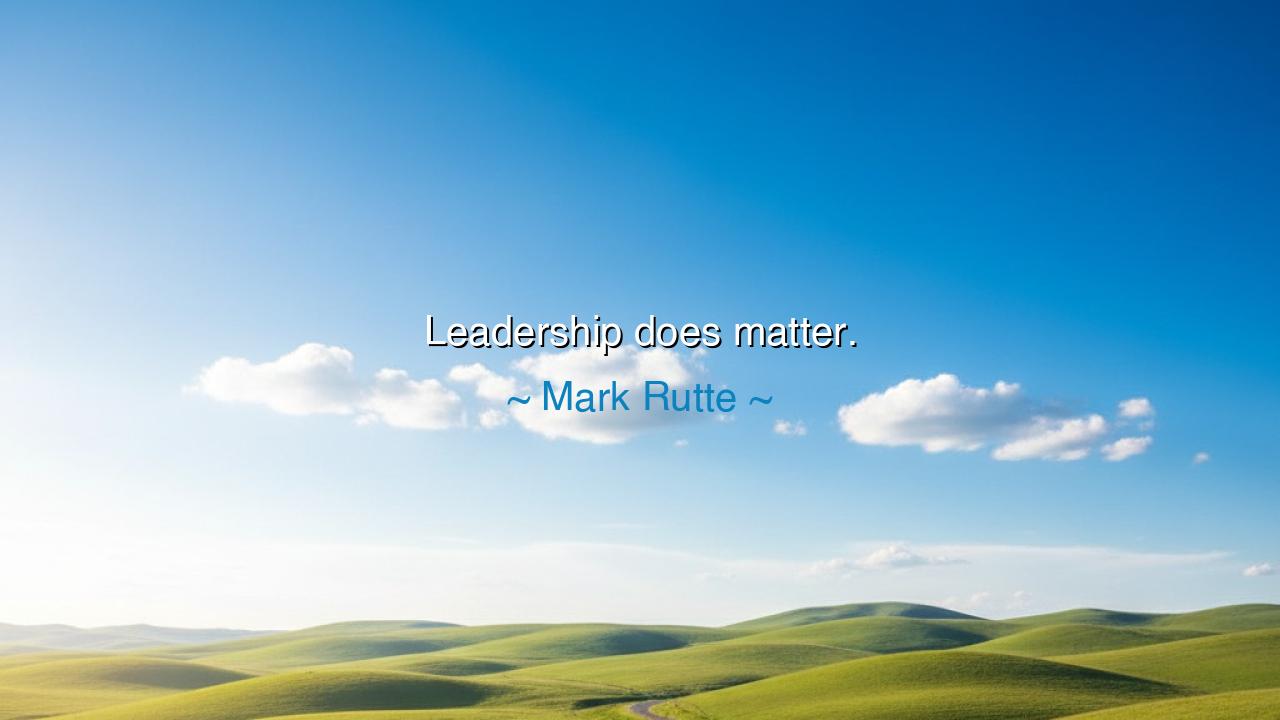
Leadership does matter.






“Leadership does matter.” — Mark Rutte
These words, brief yet thunderous in meaning, were spoken by Mark Rutte, the Dutch statesman and one of Europe’s longest-serving prime ministers. In this simple phrase — “Leadership does matter” — he distills an ancient truth that civilizations have known since the dawn of history: that the course of nations, the fate of armies, and even the spirit of a people, rise or fall upon the character of those who lead them. His statement is not a boast, but a sober recognition — that leadership is not a title or privilege, but a sacred responsibility, whose weight can elevate a people to greatness or plunge them into ruin.
The origin of this quote lies in Rutte’s reflections on governance during his years in office. As a pragmatic and unpretentious leader, he witnessed firsthand how leadership, in moments of crisis or uncertainty, can determine whether societies fracture or endure. He spoke these words not as rhetoric, but as reality — during times when Europe faced great challenges: economic turbulence, refugee crises, and the rise of division within democracies. Through these storms, Rutte reminded his people and his peers that leadership is not a luxury, nor an abstract virtue — it is the hinge upon which destiny turns.
The ancients knew this truth well. In the days of Athens, when the city stood trembling before the might of Persia, it was the vision of Themistocles that turned despair into victory. He saw what others could not — that Athens’ salvation lay not on land but upon the sea — and his foresight led to triumph at Salamis, changing the course of history. Likewise, when Rome trembled before Carthage, it was Scipio Africanus whose courage and strategy saved the Republic. In every age, the same lesson repeats: when leadership falters, chaos reigns; when leadership stands firm, even the weak can prevail.
Yet Rutte’s words carry a wisdom that extends beyond the realm of politics and war. For leadership is not confined to thrones or offices; it lives in every person who takes responsibility for others. A teacher guiding her students, a parent nurturing their children, a worker who steadies his companions through hardship — each holds within them the seed of true leadership. What matters, Rutte reminds us, is not power, but presence; not command, but character. Leadership, in its purest form, is the art of holding fast to vision when others lose sight of it, and of kindling hope when darkness falls.
History’s greatest leaders were not those who ruled by fear, but those who inspired faith. Consider Nelson Mandela, who after twenty-seven years in prison emerged not with vengeance, but with forgiveness. His leadership transformed a nation poisoned by hatred into one that dared to hope for reconciliation. Or Winston Churchill, whose unyielding voice, speaking in the bleakest hours of the Second World War, gave courage to millions: “We shall never surrender.” Such leaders prove Rutte’s truth — that leadership does matter, for it is through leadership that human beings remember their strength, their dignity, and their purpose.
But Rutte’s phrase also carries warning. For if leadership has the power to lift, it also has the power to destroy. History is filled with the wreckage of societies misled — where leaders traded truth for comfort, or ambition for conscience. When leadership becomes self-serving, it corrupts not only the ruler, but the ruled; it erodes the trust upon which civilization stands. Thus, the responsibility of leadership is both glorious and perilous — for those who wield it must remember that they do so not for themselves, but for the good of all.
Let this, then, be the lesson drawn from Rutte’s timeless words: that leadership is the soul’s test — not of one’s authority, but of one’s courage, compassion, and integrity. To lead is to stand before others in the storm and refuse to yield; to speak truth when silence would be easier; to lift those who falter, even at the cost of one’s own comfort. Leadership does not mean perfection; it means perseverance — the unbroken will to serve, even when the road is long and the burden heavy.
So, O listener, take this wisdom to heart. Whether you guide many or few, remember that leadership always matters, for every act of courage, every word of truth, every spark of hope you ignite ripples through the lives of others. The world does not change through titles or speeches, but through the quiet strength of those who refuse to turn away. Be steadfast, be humble, and be brave — for when true leadership rises, even the smallest light can dispel the darkest night.






AAdministratorAdministrator
Welcome, honored guests. Please leave a comment, we will respond soon